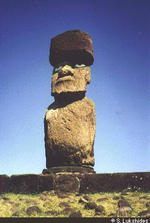| Why do societies make disastrous decisions? | 2003-05-06 23:59 6 comments |
 by Flemming Funch by Flemming FunchUniversity professor Jared Diamond talks about why societies sometimes make decisions that result in their collapse, or why they fail to make decisions that would have rectified things. What I'm going to suggest is a road map of factors in failures of group decision making. I'll divide the answers into a sequence of four somewhat fuzzily delineated categories. First of all, a group may fail to anticipate a problem before the problem actually arrives. Secondly, when the problem arrives, the group may fail to perceive the problem. Then, after they perceive the problem, they may fail even to try to solve the problem. Finally, they may try to solve it but may fail in their attempts to do so. While all this talking about reasons for failure and collapses of society may seem pessimistic, the flip side is optimistic: namely, successful decision-making. Perhaps if we understand the reasons why groups make bad decisions, we can use that knowledge as a check list to help groups make good decisions.There's an interesting little video on the site of him lecturing about it as well. Why is that kind of clarity and simplicity only found scattered among people who lecture and write books? I mean, why aren't people who ask such questions part of running our societies? Some of what he talks about is environmental mis-management. For example, the people on Easter Island cut down all the forests on their rather small island, to build canoes, roll around statues, and whatever they were doing. Thus they killed the resources their lives depended on, and they started dying off, turning to canibalism, etc. until they had turned themselves into a faint shadown of their former glory. A question is: What did the Easter Islanders think as they were cutting down the last tree? That wasn't any subtle mistake. Did they really not notice? How can we avoid making that kind of mistakes? Or, since we probably already are - how can we truly comprehend that as a society? |